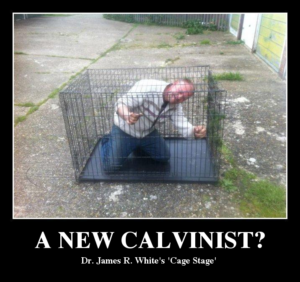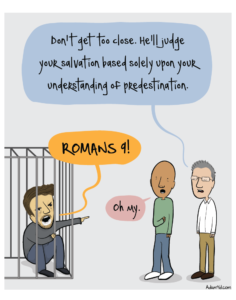There are times that I am ashamed to refer to myself as a Calvinist. Those who know me may remember that when I initially began to ascribe to the doctrines of grace, I did not even want to use the Calvinist label. I only started using it after I realized how inconvenient it was for me to refuse to use it (as people began calling me a Dortian, after the Synod of Dort). Consequently, I reluctantly began referring to myself as a Calvinist. But, the question is, if I think it is true, why the reluctance? Calvinists have a reputation for poor behavior. They are often regarded as mean-spirited, arrogant, accusing, and generally unpleasant. Many recognize that this perception emanates from a loud minority among what we call cage stage Calvinists. In this article, I will provide a few tips about how to tell if you are a cage stage Calvinist.
 First, how does one become a cage stage Calvinist, and why does that category even exist? I think that it could exist for a few different reasons. Many Calvinists are not born into the Reformed tradition. They were raised as Arminians and converted when they were presented with the doctrines of grace. Perhaps they were converted when they became Calvinists. Since their faith prior to Calvinism was shallow, carnal, uncritical, not concerned with scriptural authority, et cetera, they assume that everyone else is like that as well. Beyond that, people tend to became arrogant when they feel as though they have found the truth that so many others have missed. These and other factors lead them to behave poorly and exhibit the traits that I listed above. But it can be difficult to discern if you are in the cage stage. So, how can you tell if you are a cage stage Calvinist?
First, how does one become a cage stage Calvinist, and why does that category even exist? I think that it could exist for a few different reasons. Many Calvinists are not born into the Reformed tradition. They were raised as Arminians and converted when they were presented with the doctrines of grace. Perhaps they were converted when they became Calvinists. Since their faith prior to Calvinism was shallow, carnal, uncritical, not concerned with scriptural authority, et cetera, they assume that everyone else is like that as well. Beyond that, people tend to became arrogant when they feel as though they have found the truth that so many others have missed. These and other factors lead them to behave poorly and exhibit the traits that I listed above. But it can be difficult to discern if you are in the cage stage. So, how can you tell if you are a cage stage Calvinist?
Your ‘Hard Truth’ Is Indistinguishable From Hostility
 There are times when, as Christians, we really do have hard truths to tell, and people do not want to hear it. It is our duty to ensure that we are not compromising the truth just to appeal to people. If we do that, then we will preach something less than the gospel. People may not want to hear that Jesus Christ is the only way to the Father. They may not want to hear that God’s wrath abides on the unrighteous. They may not even want to hear that they are sinners. But we still need to be able to tell the hard truth. A cage stage Calvinist will seize upon the concept of a hard truth and justify their behavior based on that concept.
There are times when, as Christians, we really do have hard truths to tell, and people do not want to hear it. It is our duty to ensure that we are not compromising the truth just to appeal to people. If we do that, then we will preach something less than the gospel. People may not want to hear that Jesus Christ is the only way to the Father. They may not want to hear that God’s wrath abides on the unrighteous. They may not even want to hear that they are sinners. But we still need to be able to tell the hard truth. A cage stage Calvinist will seize upon the concept of a hard truth and justify their behavior based on that concept.
If somebody is guilty of that, then you will find that their hard truths are always indistinguishable from hostility, a lack of charity and a lack of grace. Anybody can say something mean-spirited and then attempt to justify themselves by saying that they are just telling hard truths. I could tell somebody whose loved one died in their sins, “They are in Hell today, burning. Good riddance, that such a sinner has left the earth.” This would be a very mean thing to say. But, when they objected, I could say, “I am just telling you the hard truth.” If your hard truth is indistinguishable from hostility and a lack of love, then you are probably a cage stage Calvinist. Examine yourself.
You Always Have A Hard Truth To Tell
Sometimes there is not a hard truth, and sometimes we do not even need to tell the hard truth. You would not necessarily have to tell somebody that their deceased spouse is in Hell. Similarly, you do not always have to get into arguments. You do not always have to tell people when they are wrong or when their doctrine is in error, especially if they are Arminians and they just say something about free will. You do not always have to engage or tell the “hard truth.” Sometimes it is better to hold back. There can be wisdom in silence (Proverbs 17:27).
But a cage stage Calvinist will always have some hard truth to tell. Christians who are more mature recognize that they do not have to be so aggressive, so defensive, always pounding tables, telling people that they are compromisers or heretics, always telling the hard truth. The hard truth does not always emerge, and it is not always wise to relay it. If you always have a hard truth on your lips, then you are probably a cage stage Calvinist. Take it easy, man.
You Compare Yourself To Jesus Christ To Justify Your Hostility
To be a Christian means to be a follower of Jesus Christ. We are disciples of Jesus. Some have said that it is almost like we are little versions of Jesus going out into the world, interacting with people. But sometimes Christians do not really have a proper image of Jesus. We imagine that he was a soft-spoken man, never raised his voice, had hearts in his eyes and never condemned anybody. If that is your image of Jesus, then it must be quite shocking when you find him saying, “You serpents, you brood of vipers, how will you escape the sentence of hell?” (Matthew 23:33). This (and the other verses like it) are seized upon by cage stage Calvinists in an attempt to justify their sin.
What is the difference? How can we distinguish between what Jesus said and the behavior of a cage stage Calvinist? Well, Jesus was the Son of God and we know that his actions emanated from a pure heart. He was telling a hard truth because it was necessary to tell a hard truth and it was the right thing to do. But that does not justify any instance in which somebody is hostile with another individual. Unlike the Messiah, we are sinful creatures, burdened with arrogance, pride, anger, and hatred. Before we go around shouting hard truths, we need to discern our motives. If you come off as being hateful, do not be surprised if people think that your motives are born out of a hateful heart rather than out of pure intentions.
Of course, there will be times when people think that somebody with pure intentions has a hateful heart. I am not saying that we should use other people to measure ourselves. But to use the fact that Jesus delivered hard truths and was not exactly polite about it as a blanket justification for our lack of grace is unwise. We know that Jesus had pure motives. We do not know if you have pure motives. We know that Jesus was telling the truth. We do not know if you are telling the truth. Examine yourself.
You Are Not Under The Authority of The Elders And The Church
In the last section, I mentioned that we should not use the judgment of other people to measure ourselves. While that is true in the sense in which I was speaking, there is another sense in which we should the judgment of others to measure ourselves. Christians are not lone wolves. There are people who are far wiser than we are. There are people who have been Christians for decades, who have gone through many of the struggles with a prideful and angry heart and have been sanctified by the grace of Christ. These are those to whom we should appeal. That is why a church has elders. Christians should be subject to the elders.
This is not just a good piece of advice. It is a command. Peter said in 1 Peter 5:5, “You younger men, likewise, be subject to your elders.” Tell the elders how you are behaving in person and even on the Internet. Tell them what you are doing, the things that you are saying, and how people are responding. Tell them that you are always telling the hard truth. If you think that you are doing the right thing, then why should you keep your interactions a secret? If you are not under the authority of the elders or if you are not a member of a Christian church, and you have become furious at this blogpost, then you are in danger of being a cage stage Calvinist.
You Do Not Know The Difference Between Inconsistency And Heresy

Typically, it emerges from failing to understand the difference between inconsistency and heresy. A particular view could logically entail heresy if it were followed to its’ conclusion. But, fortunately, adherents to that view do not always follow it to its’ logical conclusion. For example (I am intentionally choosing one related to Calvinism), one might argue that the Arminian view of the atonement logically entails universalism. One might argue that an Arminian anthropology logically entails Pelagianism. But to say that a view logically entails heresy does not make the adherent of the view a heretic. Somebody is a heretic only by confession. If somebody confesses Pelagianism, then they are a heretic. If you have not grasped this crucial distinction, then you might just be a cage stage Calvinist. If you regard Arminians as anathema, then you might just be a cage stage Calvinist.
You Became Furious While Reading This Blogpost
 Cage stage Calvinists are guilty of giving Calvinism a very bad reputation. People are not even willing to give us a hearing because so many demonstrate such poor behavior. Calvinists are seen as unloving, unkind and unwilling to examine themselves or recognize their error. No fruitful discussion could ensue with such a person and it is very likely that Arminians would become more combative toward Calvinism than they would otherwise. Many Calvinists recognize this problem as well. Calvinists have become frustrated with the behavior of cage stagers. Those Calvinists will say “Amen!” to a blogpost such as this one.
Cage stage Calvinists are guilty of giving Calvinism a very bad reputation. People are not even willing to give us a hearing because so many demonstrate such poor behavior. Calvinists are seen as unloving, unkind and unwilling to examine themselves or recognize their error. No fruitful discussion could ensue with such a person and it is very likely that Arminians would become more combative toward Calvinism than they would otherwise. Many Calvinists recognize this problem as well. Calvinists have become frustrated with the behavior of cage stagers. Those Calvinists will say “Amen!” to a blogpost such as this one.
However, a cage stage Calvinist will become furious while reading this blogpost. They will attempt to justify themselves and their behavior. They will say that there is really nothing wrong with being hostile with Arminians or with heretics and that I need to learn to tell the hard truth. Well, I am telling the hard truth, right now. If you are hostile, arrogant, and angry, if you cannot interact with civility and charity even with those with whom you disagree, grow up or stay silent. You are not helping anyone, not promoting the cause of Christ, and creating unnecessary barriers to the gospel. Either get in a cage, stop talking to people, or learn to conduct yourself.
The Practical Implications of Calvinism by Albert Martin
7 Ways To Tell If An Atheist Is Not Worth Your Time (some similar concepts)